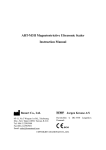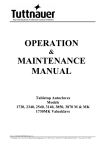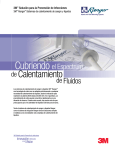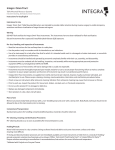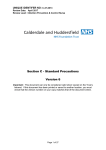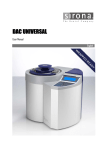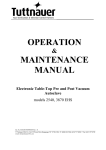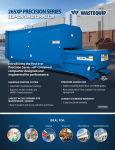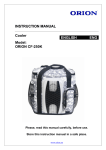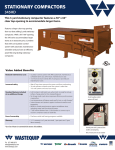Download 3M™ Comply™ 1233LF Bowie
Transcript
Technical Information 3M Comply 1233LF Bowie-Dick Test Pack ™ ™ Introduction The Bowie-Dick test, named after its developers, J. H. Bowie and J. Dick, was first described in a 1963 publication titled The Bowie and Dick Autoclave Tape Test.1 At the time, it was known that the presence of a significant amount of residual air in the sterilizer chamber of vacuum sterilizers, caused by an air leak or inadequate vacuum, would prevent thorough steam penetration into the load contents during the steam exposure phase of the sterilization cycle. However, a method for verifying the proper operation of vacuum sterilizers was not available. The paper by J. H. Bowie and his colleagues described a quick and reliable method for verifying the operation of the vacuum system of vacuum sterilizers. The test described by the authors included at least 25 huckaback towels folded into four layers along their length and then folded in half to give eight thicknesses of cloth. The towels were stacked on top of each other to a height of 10-11 inches. Two 12 inch lengths of 3M™ 1222 autoclave tape were applied to a 10 × 8 inch sheet of unglazed paper in a St. Andrew’s cross design and the sheet was put in the center of the stack of towels. The stack of towels could be enclosed in a dressing casket (a metal box used in Britain for sterilizing linens), or similar container, or wrapped in fabric. The test was run for 3½ minutes at 134ºC or 12 minutes at 126ºC. In a satisfactory cycle, the tape would show a uniform color change. However, if residual air existed in the sterilizer chamber, an air bubble would form in the center of the towel pack inhibiting the complete development of the indicator tape at the center of the sheet. This test became known as the Bowie-Dick test. Today, the Bowie-Dick test is widely used and recognized as a valuable means of monitoring the performance of vacuum-assisted steam sterilizers. However, several aspects have changed since the original work was done in Britain in the early 1960s. Most of today’s sterilizers operate differently from those used by Bowie and Dick, which drew a single deep vacuum before beginning the sterilization cycle. Prevacuum sterilizers today typically have a series of steam injections and vacuum excursions, before beginning the sterilization phase, and the vacuum depth is not as great as in the older high vacuum sterilizers. Additionally, manufacturers have developed indicator sheets designed specifically for the Bowie-Dick test. The indicator inks used on these test sheets are similar to that used on autoclave tape. Furthermore, in the U.S., the Bowie-Dick test is run at 132-134ºC (270-273ºF) for 3½ - 4 minutes. The purpose of the prevacuum phase is to remove all the air from the sterilizer chamber. This allows the steam to make contact with all the surfaces in the load. If air is present, steam penetration to all the surfaces in the load will be impeded. Causes of air remaining in the sterilizer chamber include inadequate vacuum (i.e., incomplete air removal), air leaks, or the presence of noncondensable gases in the steam. The Bowie-Dick test is run in an otherwise empty chamber because this is a more rigorous test than if the chamber was full with a normal load. If there were other packs in the chamber, any air present would be distributed throughout all the packs and thus fail to be detected by the indicator sheet in the Bowie-Dick test pack. The test pack should be placed on the bottom shelf of the sterilizer rack, over the drain, because this is the coldest spot in the sterilizer chamber. The Association for the Advancement of Medical Instrumentation (AAMI) provides specific recommendations on the make-up of a Bowie Dick towel pack.2 These include type of towels, type of wrap material, dimensions of the pack, and placement of the test sheet within the test pack. However, variability in these components can contribute to nonuniform test results. Manufacturers eliminated many of these variables by introducing disposable Bowie-Dick test packs. These disposable packs have been shown to be as effective as towel packs. Disposable test packs are small in size and eliminate the costly labor involved in making towel packs. They are an effective, inexpensive way to assure that a prevacuum sterilizer is operating properly. 3 3M™ Comply™ 1233LF Bowie-Dick Test Pack Equipment Control Indications for Use Equipment control includes verifying the sterilizer’s physical monitors (e.g., sterilizer printout) for each cycle and monitoring the effectiveness of the sterilizer’s vacuum system each day the sterilizer is used. When using prevacuum cycles, it is critical to know that the sterilizer is removing air efficiently. Monitoring with a Bowie-Dick test pack should be done on a daily basis, prior to running the first full load of the day. If a sterilizer has an inadequate vacuum, air leak, or poor steam quality, air pockets may form inside the sterilizer and compromise sterility by preventing steam penetration into some of the packs in the load. The indicator sheet inside the Bowie-Dick test pack will not develop properly if air remains trapped inside the sterilizer chamber. If a Bowie-Dick test indicates a problem, the sterilizer should be taken out of service until the malfunction is identified and corrected. The 3M Comply 1233LF Bowie-Dick Type Test Pack is designed for testing air removal efficiency of 132-134°C (270-273°F) dynamic-air-removal steam sterilizers (i.e., prevacuum). Product Description The 3M™ Comply™ 1233LF Bowie-Dick Type Test Pack consists of a leadfree steam-sensitive chemical indicator test sheet positioned in a package of layered porous materials. The porous materials are paperboard sheets that have moisture-impervious plastic layers at the top and bottom. These materials are wrapped in a non-woven, disposable wrap secured with a lead-free steam indicator label. The test sheet consists of a lead-free chemical indicator printed on paper as a yellow-colored diagonal pattern and is positioned near the center of the porous pack. The primary test sheet will turn a uniform dark brown/ black color, except when air removal failures such as air leaks occur. An air removal failure is indicated as a lighter-colored area near the center of an otherwise dark-colored test sheet. Technical Design and Performance Characteristics The 3M Comply 1233LF Bowie-Dick Type Test Pack uses impermeable layers on the top and bottom to direct steam and enhance the air capture qualities. A precisely controlled pad of porous substrate is used to establish a matrix for the formation of an air bubble and to act as a reservoir of air simulating the towels in a conventional large towel pack. The reticulated foam layer acts as a steam pathway for the control of air bubble alignment and insulates the indicator from radiant heat emanating from the hot surface of the sterilizer chamber. Air is evacuated from the chamber and the test pack during the prevacuum cycle. If an air leak is present, air will bleed back into the chamber as a vacuum is pulled. Since air is much cooler and heavier than steam, it will be forced to the bottom of the chamber near the drain when the steam valves opens. As pressure begins to increase, the air and then the steam enters the pack from the sides and top of the reticulated foam pathway at the top of the pack. The steam pressure compresses the air into a bubble and pushes it toward the bottom of the pack. As the steam pressure increases, the air bubble is squeezed smaller and smaller until the pressure stabilizes. Impermeable Layer Reticulated Foam Porous Substrate Indicator Sheet Porous Substrate Impermeable Layer Disposable Wrap Label with Indicator Instructions for Use 1. Test Frequency The Bowie-Dick test must be carried out each day in an empty sterilizer before the first processed load. A warm-up cycle (dry time may be omitted) should be run first to properly heat the sterilizer prior to the Bowie-Dick test. If the sterilizer is in use for 24 hours each day, the test may be done at any time but preferably at the same specified time each day. The Bowie-Dick test should also be performed as part of qualification testing following sterilizer installation, relocation, malfunction, major repairs, and sterilization process failures. How to Read a 3M™ Comply™ Bowie-Dick Test Pack UNPROCESSED 2. Test Cycle Before putting the Comply 1233LF Bowie-Dick Type Test Pack in the sterilizer, inspect the lead-free indicator on the label of the test pack. If any part of the indicator on the label has changed from yellow to light brown or darker, the test pack should not be used. Place the test pack horizontally, label side up, on the bottom shelf of the rack, over the drain in an otherwise empty, dynamic-air-removal steam sterilizer. Run the sterilizer for 3.5 minutes at 132-134°C (270-273°F). If timer must be set for full minute intervals, the test may be run for 4 minutes. (Do not process for more than 4 minutes; results will be invalid.) PASS Bowie-Dick test sheet shows a uniform color change to dark brown/black. 3. Interpretation of Results Promptly remove the test pack from the sterilizer after completion of the cycle. Once processed, the indicator ink on the label will change from yellow to light brown or darker. Allow the test pack to cool; retrieve and examine the test sheet. Pass – A satisfactory test result is indicated by a test sheet that shows uniform dark brown/black color development. A uniform color change result indicates rapid steam penetration, adequate air removal, and lack of significant air leaks. (See pictures for examples). Fail – An unsatisfactory test result is indicated by a test sheet that shows non-uniform color development with a lighter-colored area in the indicator ink pattern, usually near the center of the test sheet. A non-uniform color change result is caused by residual air in the sterilizer chamber and indicates incomplete air removal from the chamber or failure of the sterilizer to hold a vacuum during the test cycle. (See pictures for examples.) If a non-uniform color change is noted for the first test, retest the sterilizer. If the second test also shows a non-uniform color change, it should be reported immediately to the supervisor and that sterilizer should not be used until it is examined for possible malfunction. 4. Maintain all test sheets in records. FAIL Bowie-Dick test sheet shows a non-uniform color change. Test sheet result indicates a small amount of residual air in the chamber. Bowie-Dick test sheet shows a non-uniform color change. Test sheet result indicates a large amount of residual air in the chamber. 3M™ Comply™ 1233LF Bowie-Dick Test Pack Storage and Shelf Life Store in a dry (<50% RH) condition at room temperature [15-30°C (59-86°F)] and protect from direct light. Do not store near strong alkaline or acidic products such as cleaning or disinfecting agents. After use the indicator will not change visually within 24 months when stored at above conditions. The 3M™ Comply™ 1233LF Bowie-Dick Type Test Pack has a 2-year shelf life from the date of manufacture when stored at recommended conditions. The expiration date is printed on the label that secures the test pack. References 1 B owie JH, Kelsey JC, and Thompson PR. The Bowie and Dick Autoclave Tape Test. Lancet 1963; 1:586. 2 A ssociation for the Advancement of Medical Instrumentation. Comprehensive guide to steam sterilization and sterility assurance in health care facilities. ANSI/AAMI ST79:2006, A1:2008 and A2:2009. 3 3M Health Care Infection Prevention Division 3M Center, Building 275-4E-01 St. Paul, MN 55144-1000 1-800-228-3957 www.3M.com/infectionprevention Please recycle. Printed in USA. Issued:2/10 © 3M 2010. All rights reserved. 7137HB 70-2010-7556-4 (210.25) DPI Comply and 3M are trademarks of 3M. Used under license by 3M subsidiaries and affiliates.






